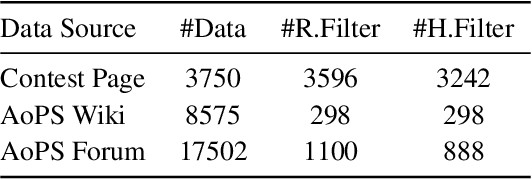Chenghao Ma
FinMMR: Make Financial Numerical Reasoning More Multimodal, Comprehensive, and Challenging
Aug 06, 2025Abstract:We present FinMMR, a novel bilingual multimodal benchmark tailored to evaluate the reasoning capabilities of multimodal large language models (MLLMs) in financial numerical reasoning tasks. Compared to existing benchmarks, our work introduces three significant advancements. (1) Multimodality: We meticulously transform existing financial reasoning benchmarks, and construct novel questions from the latest Chinese financial research reports. FinMMR comprises 4.3K questions and 8.7K images spanning 14 categories, including tables, bar charts, and ownership structure charts. (2) Comprehensiveness: FinMMR encompasses 14 financial subdomains, including corporate finance, banking, and industry analysis, significantly exceeding existing benchmarks in financial domain knowledge breadth. (3) Challenge: Models are required to perform multi-step precise numerical reasoning by integrating financial knowledge with the understanding of complex financial images and text. The best-performing MLLM achieves only 53.0% accuracy on Hard problems. We believe that FinMMR will drive advancements in enhancing the reasoning capabilities of MLLMs in real-world scenarios.
Omni-MATH: A Universal Olympiad Level Mathematic Benchmark For Large Language Models
Oct 10, 2024



Abstract:Recent advancements in large language models (LLMs) have led to significant breakthroughs in mathematical reasoning capabilities. However, existing benchmarks like GSM8K or MATH are now being solved with high accuracy (e.g., OpenAI o1 achieves 94.8% on MATH dataset), indicating their inadequacy for truly challenging these models. To bridge this gap, we propose a comprehensive and challenging benchmark specifically designed to assess LLMs' mathematical reasoning at the Olympiad level. Unlike existing Olympiad-related benchmarks, our dataset focuses exclusively on mathematics and comprises a vast collection of 4428 competition-level problems with rigorous human annotation. These problems are meticulously categorized into over 33 sub-domains and span more than 10 distinct difficulty levels, enabling a holistic assessment of model performance in Olympiad-mathematical reasoning. Furthermore, we conducted an in-depth analysis based on this benchmark. Our experimental results show that even the most advanced models, OpenAI o1-mini and OpenAI o1-preview, struggle with highly challenging Olympiad-level problems, with 60.54% and 52.55% accuracy, highlighting significant challenges in Olympiad-level mathematical reasoning.
ChatKBQA: A Generate-then-Retrieve Framework for Knowledge Base Question Answering with Fine-tuned Large Language Models
Oct 13, 2023



Abstract:Knowledge Base Question Answering (KBQA) aims to derive answers to natural language questions over large-scale knowledge bases (KBs), which are generally divided into two research components: knowledge retrieval and semantic parsing. However, three core challenges remain, including inefficient knowledge retrieval, retrieval errors adversely affecting semantic parsing, and the complexity of previous KBQA methods. In the era of large language models (LLMs), we introduce ChatKBQA, a novel generate-then-retrieve KBQA framework built on fine-tuning open-source LLMs such as Llama-2, ChatGLM2 and Baichuan2. ChatKBQA proposes generating the logical form with fine-tuned LLMs first, then retrieving and replacing entities and relations through an unsupervised retrieval method, which improves both generation and retrieval more straightforwardly. Experimental results reveal that ChatKBQA achieves new state-of-the-art performance on standard KBQA datasets, WebQSP, and ComplexWebQuestions (CWQ). This work also provides a new paradigm for combining LLMs with knowledge graphs (KGs) for interpretable and knowledge-required question answering. Our code is publicly available.
 Add to Chrome
Add to Chrome Add to Firefox
Add to Firefox Add to Edge
Add to Edge